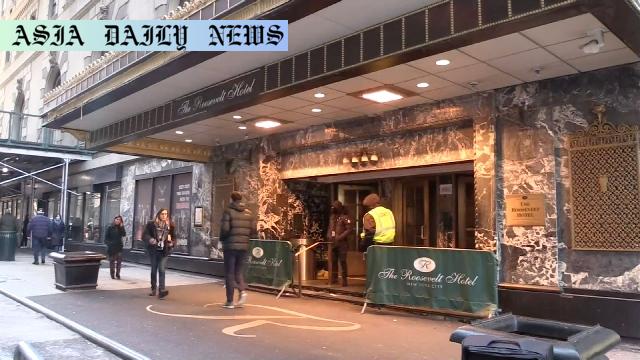immigration: An iconic New York hotel ends its months-long role as a migrant shelter amidst political and social debates.
The Roosevelt Hotel in New York City is set to close its doors as an immigrant shelter.
Mayor Eric Adams announced the closure following a significant decrease in weekly migrant arrivals.
This decision comes amid criticism of a perceived shift in policies towards a more restrictive approach on immigration.
There are speculations about political influences, including federal corruption charges tied to cooperation with the Trump administration.

Roosevelt Hotel’s Closure: A Turning Point in NYC’s Immigration Crisis
A Beacon of Hope: The Roosevelt Hotel’s Role in Shelter Operations
The Roosevelt Hotel, a landmark in Midtown Manhattan, has long been an emblem of New York City’s history and resilience. In May 2023, this iconic structure found new life as a temporary shelter, when it opened its doors to provide refuge for the thousands of migrants arriving from South America and other regions. The decision was heralded as a humanitarian effort in response to an acute crisis that had overwhelmed the city’s existing resources.
An Unsustainable Effort Amid Declining Numbers
At the height of the immigration surge, Mayor Eric Adams revealed that New York City was receiving an influx of over 4,000 migrants weekly. As the crisis stabilized, those numbers dropped significantly to around 350 migrants per week. Consequently, the city’s administration announced the hotel’s planned closure as a shelter, citing changing needs and the logistical challenges of continuing the operation.
Impact on Immigrant Families
The decision to close the Roosevelt Hotel as a shelter has left many migrant families scrambling for housing options and security. One migrant currently residing at the hotel expressed concern after learning about the closure from a notice posted that morning. With limited affordable housing options in New York City, families are now forced to search for alternatives in an already strained environment.
Political Dynamics Behind the Closure
The decision to transition the Roosevelt Hotel from a shelter back to its original purpose is not without controversy. New York City is renowned for its liberal stance on immigration. However, Mayor Eric Adams’ perceived cooperation with the Trump administration on restricting illegal immigration has raised questions and drawn criticism. Observers have pointed to timing and political motivations, suggesting that this new stance might be linked to agreements or concessions with federal authorities, such as the dropping of corruption charges against Adams.
The Broader Implications for Immigration Policy
The closure of the Roosevelt Hotel sheds light on the broader challenges facing cities like New York, which have long served as destinations for migrants seeking better opportunities. While providing temporary solutions has been an essential part of the response, the sustainability of such measures remains in question. In a climate of heightened political division over immigration, decisions like these carry weight as symbolic indicators of shifting attitudes and priorities.
Moving Forward: Balancing Acts and Solutions
As the Roosevelt Hotel prepares to conclude its role as a migrant shelter, questions remain about the city’s future responses to potential migration surges. Advocates for immigrants are urging city officials to adopt long-term strategies that include affordable housing and comprehensive support for asylum seekers. Though the hotel’s closure might address immediate operational challenges, it underscores the urgent need for deeper systemic reforms to address immigration at both local and national levels.
Such decisions remind us of the delicate balance between compassion and pragmatism in addressing one of the most significant social issues of our time. How cities like New York adapt and respond will serve as a bellwether for the wider conversation on immigration in the United States.
Commentary
The Human Cost of Policy Decisions
The decision to close the Roosevelt Hotel as a migrant shelter raises genuine concerns about the immediate impact on immigrant families who relied on it as a safe haven. While the declining influx of migrants may have justified the logistics behind the move, it also reveals the precarity that many asylum seekers face. Migrants often arrive in cities like New York with little more than hope, and sudden shifts in policy can shatter that hope, leaving many displaced yet again.
Political Intrigue and Its Local Consequences
The intersection of federal and local politics adds another layer of complexity to this issue. Mayor Adams’ apparent coordination with the Trump administration hints at the fraught compromises and difficult terrain local leaders must navigate in today’s polarized political climate. Whether or not these decisions were influenced by external pressures, the optics of cooperation with policies perceived as restrictive will likely anger advocates and citizens who expected more consistent humanitarian approaches.
Seeking Long-Term Solutions
This moment should prompt serious reflection. While temporary measures might provide immediate relief, they are neither scalable nor sustainable for the long-term challenges posed by migration. It is imperative that it sparks conversation on broader reforms—whether through affordable housing, coordinated federal actions, or partnerships with non-governmental organizations—that can provide more enduring solutions.
A Call for Compassionate Leadership
Leadership should be about balancing ethical obligations and practical realities, especially when addressing vulnerable populations. The Roosevelt Hotel’s closure symbolizes a critical juncture, not only for New York but for how the United States as a whole should approach the responsibility that comes with receiving migrants. Understanding their plight while crafting sensible, empathetic policies is the need of the hour.


